Meet Sunita Chaudhary…25
Sunita is the current central president of the Freed Kamlari Development Forum (FKDF), a community-based organization in Ghorahi, Dang district in Nepal that hopes to “build a civilized, prosperous and developed Kamlari free society.” Since its establishment in June 2010, FKDF has assisted many freed Kamlaris to better themselves economically and socially through advocacy, empowerment and entrepreneurial programs implemented by FKDF. Her commitment, and that of the organization in which she serves, is to “work for the welfare, economic and social empowerment of the freed Kamlaris.”
Living in poverty, Sunita was forced to go to work for a landlord in Ghorahi under the false pretense that she would be provided with an education, a necessity that her parents could not accord her. When her grandmother passed away, her parents borrowed money from a landlord and sent her to work for him as a way to repay the loan. She was immediately forced into a system that she knew nothing about. At the tender age of 8, she was held as a bonded laborer doing domestic chores for a household of 28 members. Her childhood stolen from her.
Back then, it seemed that Sunita was destined to follow in her family’s footsteps to become a bonded laborer. But that changed when she was rescued by the Friends of Needy Children after 2 years working as a Kamlari. This organization later became the Freed Kamlari Development Forum (FKDF). As a young girl, Sunita knew that helping free her fellow sisters was her destiny. She said that those 2 years she worked as a Kamlari confronted her with the truth about the crimes against young Tharu girls and challenged her to face up to her responsibility as a Tharu community member to protect young girls from human and child rights’ violations. Sunita has risen through the ranks within FKDF, serving first as a social mobilizer and later on as a district president and now serves as the central president of the entire organization. As a way of formalizing her training, she is pursuing her bachelor’s degree in Education at Mahendra Multiple Campus. She hopes to use this opportunity to further advance the agendas set out by FKDF.
With a total number of approximately 13,000 members, FKDF has not only grown in size but also in capacity and has championed for the betterment of the lives of former Kamlaris. FKDF has offered short term vocational programs to a number of these young women who have gone to become small business owners in several sectors. These vocational training programs enable these young women to earn an income and build crucial life skills. These young women lack access to financial capital and have limited opportunities to gain education, knowledge, and skills that can lead to economic advancement. The inadequate policy frameworks and inequitable gender norms also often create barriers to their economic advancement.
Of the different services offered by FKDF, the issuing of identity card to freed Kamlaris is of the most importance as it has become a necessity for people to access various services offered by governmental and a few non-governmental institutions. With these identity cards, former Kamlaris can apply for national identity cards from the government which gives them proof of citizenship, access to scholarship opportunities form the government (the government has set aside 12 million Nepali Rupees as an education fund for former Kamlaris), access to subsidized vocational training programs offered by the government, employment in government agencies and access to subsidized land from the government. The process of receiving these national identity cards is a tall order. In Dang district alone, there are 5,546 former Kamlaris but so far only 500 of them have received the identity cards. Issues of citizenship, statelessness and marginalization have featured the Tharu community in Nepal. This is a group of people with historical or ethnic ties to Nepal but have been rendered stateless for generations. International treaties proclaim citizenship as a basic right. The fact that they are not recognized by the government as citizens exposes them to many challenges, ranging from denial of basic rights to access to employment, housing, education, and healthcare.
What I took out of my meeting with Sunita was that delivering the freedom to all Kamlaris and achieving the poverty eradication goal in accordance to the Sustainable Development Goals demands renewed policy approaches and more comprehensive and sophisticated knowledge. Beyond the traditional practices of domestic slavery and servitude, an old problem continues to exist and permeate. She said that poverty among the Kamlaris can only be solved by tackling the issue of inequality among the different castes in Nepal. So long as injustice and exploitation continue to be part of our economic, social and cultural systems, poverty will continue to devastate the lives of thousands of Kamlaris.
Posted By Michelle Nyaga
Posted Jul 21st, 2018


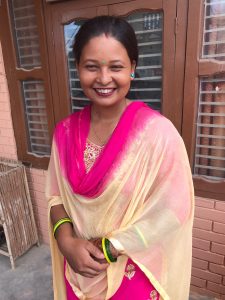
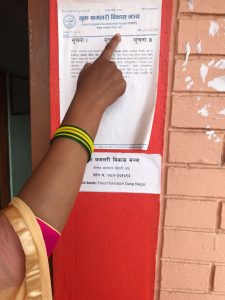
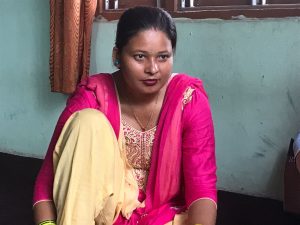
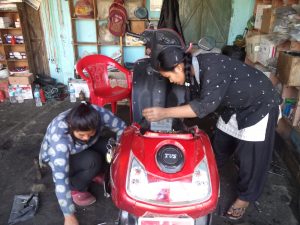
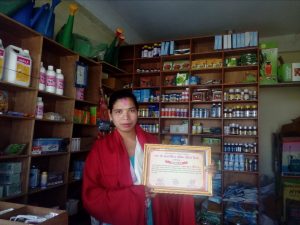

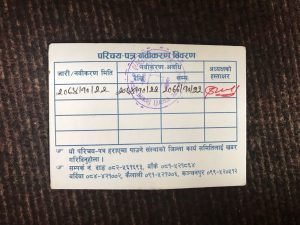
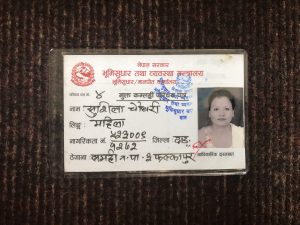
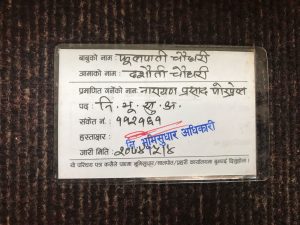
4 Comments
Corinne Cummings
July 23, 2018
Hey Michelle, you provided a lot of enlightening information. Thank you for explaining everything so thoroughly and for being so detail oriented. Even though you have only been in Nepal for a few weeks, you have made a substantial amount of progress. I liked reading your introduction on Sunita and learning more about the work that she does for FKDF. The job that she has is inspirational, to say the least — there is a need to take a stand for the lives who were subjected to this bonded labor/slavery. I am looking forward to seeing and hearing what’s next to come with your work in the Dang District through your blog posts and pictures. Good luck out in the field, Michelle! Best, Corinne
Princia Vas
July 23, 2018
Hi Michelle,
Thank you for profiling Sunita and sharing her storing with us. Very inspiring indeed:)
Great work!
Ali
July 23, 2018
Hi Michelle, great post! It is helpful to understand that poverty among the Kamlaris derives from systemic inequality – I am looking forward to learning more!
iain
August 5, 2018
Excellent blog! So glad that you have been able to connect with this very good group and write such a detailed description of their work. I think they would make a wonderful partner for AP and I hope you will explore that when you are there. Good work!